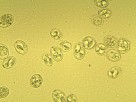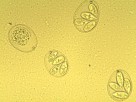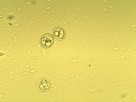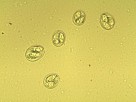Coccidiosis in poultry is a parasitic disease of the gastrointestinal tract caused by a single cell protozoan parasite of the family Eimeria. The economic losses caused by coccidiosis are enormous and thus priority is given to control of this disease in the commercial poultry sector. The widely used control measures are anticoccidials and coccidiosis vaccines.
The principle of vaccination relies on artificial infection of susceptible animals with controlled numbers of either virulent or attenuated strains of coccidian oocysts that elicit a low-level infection upon which the organism responds with specific immunity. After several life-cycles of the vaccinal coccidia, infected animals develop protective immunity. Live vaccines of either virulent or attenuated lines of Eimeria are currently used throughout the world with the exception of Europe, where virulent vaccines are not allowed.
In domestic fowl seven Eimerian species are known parasites. Nevertheless, in terms of their pathogenicity and economic significance for the commercial poultry industry, Eimeria acervulina, E. maxima, E. necatrix and E. tenella are important. In turkeys there are also seven species of coccidia recognised but the mainly pathogenic ones are Eimeria adenoeides, E. meleagrimitis and E. gallopavovis.
Our current research activities are focused on the innovation of live attenuated coccidiosis vaccines (LIVACOX® T and LIVACOX® Q) and development of new immunobiologicals – i.e. recombinant coccidiosis vaccines for domestic fowl and vaccines for other avian species.
pics: Sporulated coccidia oocysts
The main component of the research activities is the study of genomic DNA of Eimeria. On the basis of knowledge of the identity and sequence of individual genes, it is possible to develop precise methods of identification of coccidia that may pave the way for therapeutic utility of particular genes.




